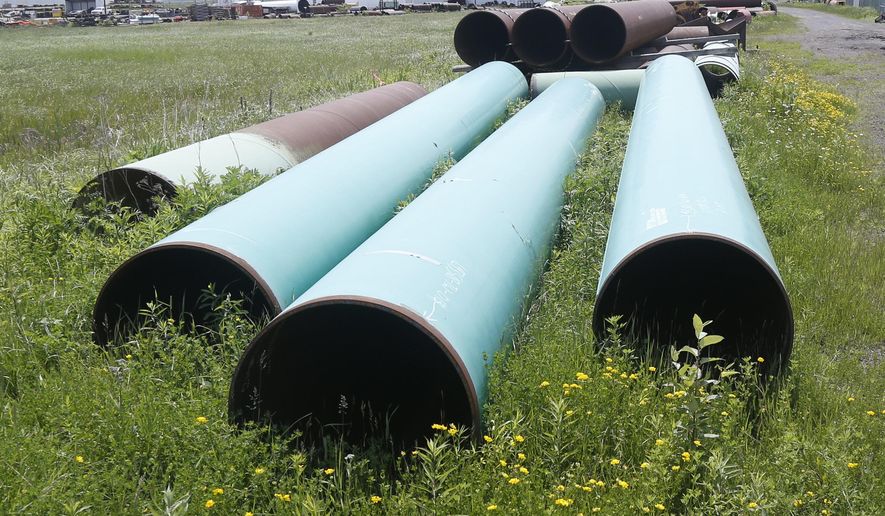Sixteen Republican state attorneys general want the Biden administration to reverse course and resume construction of the Keystone XL pipeline following a report that U.S. officials want to increase oil imports from Canada to blunt prices at the pump, but without a new pipeline.
“[W]e have repeatedly asked you to reconsider this misguided (and we continue to believe unlawful) decision,” the attorneys general, led by Montana’s Austin Knudsen, wrote to President Biden Monday. “We warned you then if your decision was not reversed, Americans would ‘suffer serious detrimental consequences,’ consumers would pay higher prices, and our allies would become further dependent on Russian and Middle Eastern oil.”
“We hate to say we told you so,” they said.
Keystone was effectively killed by Mr. Biden on his first day in office when he canceled a crucial permit, a move that has prompted calls from Republicans ever since to change his decision and finish the job.
Republicans and critics of the administration have long contended it would decrease gas prices with increased supply. Gas prices have reached all-time highs due to inflation, a lack of global supply and the war in Ukraine.
The pipeline, which wasn’t slated to be completed until next year, would have transported hundreds of thousands of barrels of Canadian oil into the U.S. each day.
The Wall Street Journal reported earlier this month that the administration was considering options for increasing Canadian oil imports via established transport routes, such as by rail or expanding existing pipeline capacities. However, bringing Keystone back to life is reportedly not under consideration.
During a trip last week to Alberta, the Canadian region that would have supplied the Keystone pipeline with crude oil, centrist Democratic Sen. Joe Manchin III of West Virginia restated his displeasure with Mr. Biden’s decision and said it would “be foolish not to” reconsider Keystone as a potential solution to combat high energy costs.
Mr. Biden’s chief economist, Brian Deese, recently pushed back on the notion that the pipeline would lower costs because it was an infrastructure project that would not have increased production.
“Any action on Keystone wouldn’t actually increase supply, and it would transmit oil years in the future,” Mr. Deese told CNBC. “What we’re focused on right now is what we can do right now, and … there are wells that are shut in and that can be brought back online over the course of the next couple months. What we need right now is to address the immediate supply disruption.”
The other 15 states that signed onto Mr. Knudsen’s letter requesting the reinstatement of the pipeline are Alabama, Alaska, Arizona, Arkansas, Florida, Indiana, Louisiana, Missouri, Mississippi, Oklahoma, South Carolina, Texas, Utah, West Virginia, and Wyoming.
SEE ALSO: Biden to agencies: Make sure infrastructure materials funded by law are ‘Made in America’
• Ramsey Touchberry can be reached at rtouchberry@washingtontimes.com.




Please read our comment policy before commenting.